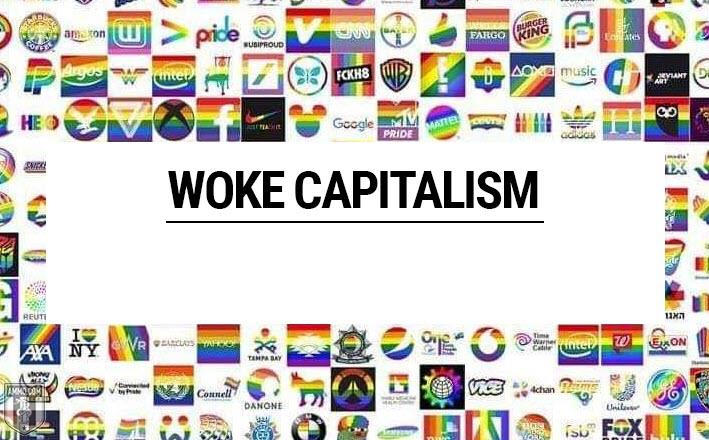ESG Is The Folly Of “Woke Capitalism”
Tyler Durden
Sat, 08/29/2020 – 12:55
On August 24, the Manhattan Institute held an eventcast on the rising trend of environmental, social, and governance (ESG), titled “Stakeholder Capitalism and the Future of American Democracy.”
President Reihan Salam interviewed Vivek Ramaswamy, a biotech entrepreneur and founder and CEO of Roivant Sciences.
For background, ESG criteria are a set of standards for a corporation’s operations utilized by “socially conscious” investors to screen potential investments. Environmental criteria, for instance, consider how a company performs as a steward of nature in abating climate change. Social criteria look at managing relationships with suppliers, customers, employees, and local communities. Among other things, governance deals with a company’s leadership, executive pay, and shareholder rights.
CEO Ramaswamy expressed a variety of concerns with ESG spreading across the business landscape. ESG has pushed corporations beyond their traditional model of profit seeking into the unstable realm of social activism. In such stakeholder capitalism, the problem is that workers and investors in a corporation could become worse off with such an outside focus. Investors in a company, for instance, are not meant to try to exemplify a society’s supposed core values.
Further, the reality is that business leaders have no better judgment than average citizens in terms of making ESG decisions. Our values should be reflected in our democracy and our voting. Instead of setting the social agenda, corporations should stay in the market and provide quality products. Extending beyond this primary purpose is the wrongful goal of acquiring more political and social power.
ESG has also created a real division in our society: the accountable (e.g., laborers) vs. the unaccountable (e.g., tenured academics). For example, reaching beyond the scope of profit seeking, ESG forces money managers to become accountable to all of society, thus effectively losing real accountability to anyone. The elite managerial class of business is becoming increasingly unaccountable as it veers out of its lane.
Perhaps the biggest problem is that “woke capitalism” has created career-ending risk for those daring to speak out.
We are now dangerously installing an idea-fixing cartel that continues to constrain debate. “Cancel culture” has ensured that any person going against the thinking of the movement can very easily lose a job or career. We must all stand up for the free thought of ideas, and business leaders should actively promote freethinking, a pillar of American society.
Indeed, the hypocrisy in woke capitalism must always be exposed.
China, of course, is the real winner in the ESG movement. Thus far, corporations involved have shriveled from offending the dictatorial Chinese Communist Party because that means risking access to the immense Chinese market. Incredibly, Beijing has successfully lobbied U.S. companies to limit the free speech of their own American employees, a glaring affront to our country’s ideals. Apple, the National Basketball Association, and the Hollywood movie machine are just a few recent offenders, censoring their own free speech to placate China.
This is a gigantic hole in the ESG movement that could eventually be its undoing.
This narrowing of ideas brought on by woke capitalism is clearly erroneous; the facts on the ground can quickly change. For example, YouTube has committed to using its fact-checkers to remove COVID-19 videos that spread “misinformation” or are arbitrarily deemed dangerous, such as videos pushing back on state or local lockdown orders during the pandemic. YouTube justified these deletions by claiming that the videos went against the recommendations of the World Health Organization (WHO) and were thus a threat to public safety.
The folly with YouTube’s thinking is obvious.
Early on in the pandemic, for instance, the WHO was proved wrong for its questioning of human-to-human transmission. Additionally, as recently as the end of March, the WHO was advising against the use of face masks, which suggests that pro-mask videos on YouTube at the time should have been removed, per the company’s own policy. But now, the WHO’s guidance and advice is to wear a face mask “to protect against and limit the spread of COVID-19.”
The reality, then, is that YouTube today could be removing videos that ultimately prove to be factually correct. Especially for science, knowledge is always evolving and our beliefs can be promptly proved false, highlighting why free communication remains so essential.
Lastly, CEO Ramaswamy believes that shareholders enjoying limited liability is the thin thread that holds the ESG movement together. This is the concept that when a company is sued, the claimants are suing the company, not its owners or investors, protected by limited liability. As ESG continues to spread its tentacles and mission creep pushes corporations beyond the market and supply of goods, they should be forced to drop this limited liability privilege.
A prime example is the ESG push for climate change action – seemingly at all costs. Policies that force the use of more expensive and less reliable renewable energy, while forcing the divestment of more affordable and dependable fossil fuels, would certainly increase the cost of energy (e.g., in California and New York). Without limited liability, consumers might one day be able to sue an ESG titan like BlackRock if their energy bills spike. As another example, one recent economic study concluded that the ESG push for fossil fuel divestment could cause a 25% drop in portfolio growth, leaving trillions of dollars in shortfalls for pension-fund holders who could seek to sue their own negligent money managers.
Ultimately, it is the removal of limited liability that could leave ESG as just another fad destined to fade away.
via ZeroHedge News https://ift.tt/2Gddjfv Tyler Durden
